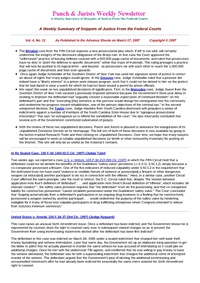Case held that doctrine of co-conspirator liability could not be used to demonstrate constructive possession of a gun for purposes of denying a defendant the benefits of the safety valve provisions.
Recently, the Fifth Circuit held, in U.S. v. Wilson, 105 F.3d 219 (5th Cir. 1997), that a …
This case raises an interesting and timely issue: May a court grant a downward departure at sentencing based on a confluence of ethical violations by the prosecutors and defense attorneys involved? Here, the trial court found that the Government had engaged in misconduct by entering into plea negotiations with …
In this case the Fifth Circuit gave its seal of approval to a prosecutorial ploy of burying defense counsel with a 500,000 page cache of documents and held that prosecutors have no duty to point the defense to specific documents within that mass.
This case gives new meaning …
Here the court held that when a prisoner is released prior to expiration of his sentence through no fault and the authorities make no attempt over a lengthy period of time to reacquire custody over him, he should not be required to serve the balance.
An example of …
The issue in this case was whether a defendant may be denied a sentence reduction for acceptance of responsibility under U.S.S.G. § 3E1.1(b) when he admits the factual basis for his guilt, but challenges the legal basis for the sentence. Here, the defendant pled guilty to bank fraud in …
This is a powerful and disturbing decision by Judge Hawkins of South Carolina in which he dismissed with prejudice a series of indictments against a number of legislators due to egregious prosecutorial misconduct and subornation of perjury.
Attorney Lionel Lofton from Charleston, South Carolina has sent us one …
QUOTE OF THE WEEK - The demonizing game of tacking skins of victims to the wall!
"While lawyers representing private parties may -- indeed, must -- do everything ethically permissible to advance their clients interests, lawyers representing the government in criminal cases serve truth and justice first. The prosecutor's …
Here the Court held that the right to counsel for the pending charge cannot constituitionally be isolated from the right to counsel for an uncharged offense.
To prevent the Government from circumventing the defendant's Sixth Amendment right to counsel, the Court held that the Government may not use …
One of the issues raised in this case is the increasingly important question: what standard of proof applies at sentencing to support a charge of obstruction of justice under U.S.S.G. § 3C1.1? Ever since the Supreme Court ruled, in U.S. v. Dunnigan, 507 U.S. 87 (1993), that the Constitution …
Here the Court ruled that a prisoner had a "liberty interest" in a prison work-release program, such that it could not be denied to him on the pretext that he had dared to wear a watch for which he had not been issued a permit by prison officials.
…
Here using what it called the "aggregate sentencing approach", the Court held that the "presumption of vindictiveness" discussed in North Carolina v. Pearce did not apply to the facts of this case and it affirmed the new sentence.
This case raises an old question - what constitutes vindictive …
This case raises an unusual Sixth Amendment issue: Once a defendant has been indicted, and the Government knows he is represented by counsel, does the right to counsel carry over to subsequent related charges so as to prevent the Government from using incriminating statements elicited after the defendant has …
